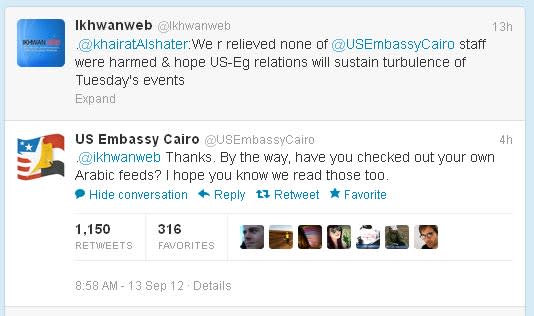 The Lookout
The LookoutU.S. Embassy calls out Muslim Brotherhood for conflicting tweets

The U.S. called out the Muslim Brotherhood for apparently tweeting a different set of messages—a kind one in English, and one in Arabic with a different tone—as demonstrators and security forces were battling outside the embassy in Cairo.
The Muslim Brotherhood's English-language Twitter account (@Ikhwanweb) retweeted a message from deputy head Khairat el-Shater saying he was "relieved none of @USEmbassyCairo staff was harmed" and hoped U.S.-Egypt relations "will sustain [the] turbulence of Tuesday's events."
However, according to ahramonline.com, the Brotherhood's Arabic-language Twitter account and its website were praising the protests staged against a U.S.-made film that some Muslims deem insulting to the Prophet Muhammad. The Brotherhood's messages also called for a million-man march on Friday.
That prompted an interesting response from the U.S. Embassy in Cairo: "Thanks. By the way, have you checked out your own Arabic feeds? I hope you know we read those too."
Later the Brotherhood responded, "we understand you're under a lot of stress, but it will be more helpful if you point out exactly the Arabic feed of concern."

The exchange in cyberspace underscores the relationship between Egypt and the U.S.
President Barack Obama said in an interview with Spanish-language network Telemundo, "I don't think that we would consider them an ally, but we don't consider them an enemy."
Egypt is a "new government that is trying to find its way," Obama said. The president warned, however, that if the Egyptian government takes actions showing they're not taking responsibility, then it would "be a real big problem."
Egypt's Islamist President Mohammed Morsi said Thursday he backed peaceful protests but not attacks on embassies after Egyptians angry at the film climbed into the U.S. Embassy in Cairo and tore down the American flag.
The New York Times noted that Egypt, not Libya where U.S. Ambassador Chris Stevens was killed, may be a bigger political issue for the U.S.
Martin S. Indyk, a former U.S. ambassador to Israel, told the Times, "On the one hand, you didn't have Americans getting killed, but this was the fourth time an embassy was assaulted in Cairo with the Egyptian police doing precious little."
"And where was President Morsi's condemnation of this?" Indyk asked.

